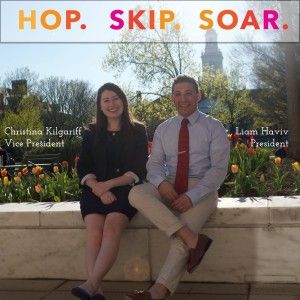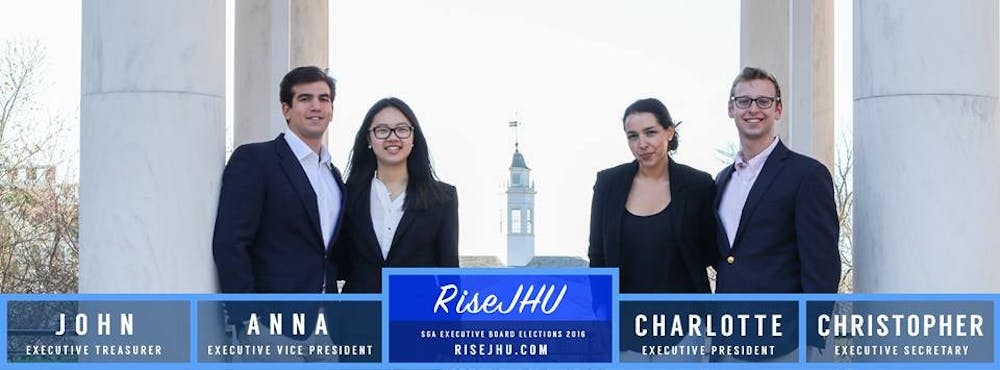Voting for the Student Government Association (SGA) Executive Board elections begins on Friday, April 8. An Executive President, Executive Vice President, Executive Treasurer and Executive Secretary will be elected for the 2016-2017 school year to preside over the SGA and student body. Over the past week, candidates have been campaigning to win students’ votes and promote their platforms.
One ticket, “RiseJHU,” consists of junior Charlie Green running for Executive President, sophomore Anna Du for Executive Vice President, sophomore John Tycher for Executive Treasurer and junior Chris Beckmann for Executive Secretary. Green, Du and Tycher are all current members of SGA, serving as SGA Executive Vice President, Sophomore Class President and Sophomore Class Senator, respectively.
Another ticket, “Hop, Skip, Soar” consists of junior Liam Haviv running for Executive President and junior Christina Kilgariff running for Executive Vice President. Haviv is currently a senator in the SGA Junior Class Council.
Finally, sophomore John Hughes is running for Executive President.
The News-Letter spoke to the candidates to understand their platforms and their stances on pertinent issues on campus such as mental health, diversity and race and the University’s new party registration policy. Additionally, they discussed their qualifications to be on the SGA Executive Board.
Green’s ticket discussed changes such as including more tables in Brody, offering discounted nights for upperclassmen at the FFC and putting another squat rack in the gym. RiseJHU also suggested the creation of a Club Championship Reserve Fund as well as more support for international students.
Beckmann and Du have worked closely throughout the school year for the creation of this reserve fund.
“This [Club Championship Reserve Fund] would provide funding support for any student organization, especially sport club teams that make it and qualify for national competitions, to enable them to make it and represent Hopkins at the national level because currently the mass majority of these student groups don’t get funding support for players,” Du said.
To support international students, Du has organized a student forum as well as an SGA ad-hoc committee to address issues that international students face.
The subject of mental health has been a pertinent issue on campus, brought to the forefront when former SGA Executive President Jason Plush stepped down due to mental health concerns. RiseJHU discussed the creation of a mental health task force and stressed the need for a relationship between administration, faculty and students to address this issue.
“I believe that mental health is gaining significant and warranted attention among the administration,” Tycher wrote in an email to The News-Letter. “However, we can and need to do a better job as a community in understanding and promoting what factors lead to a healthy, well-balanced mind. In short, we need to strive for as close to a symbiotic relationship as possible between students and faculty.”
On the subject of diversity and race on campus, RiseJHU seeks to communicate with campus cultural groups as well as the Center for Social Concern (CSC).

Regarding the new party registration policy, RiseJHU plans on discussing changing the seven-day rule to make it easier for students to register policies and increase the number of parties being registered.
“We’d definitely want to work with administration on that because we think the seven-day rule is kind of long, we get where administration is coming from, but we’d like to shorten that length,” Green said.
On the team’s qualification, Green emphasized the experience this group has had with SGA.
“Experience and organization, I’d say, are two major things,” Green said. “Anna has been on SGA since freshman year, and I’ve been a senator since sophomore year, and now I’m Executive Vice President this year, so we have a lot of experience as to what works in SGA, and we have seen how to transition well into the next year which is an important thing.”
They also stressed the different backgrounds they were coming from and how that gives them a better understanding of the issues facing students.
“In reference to Chris and I, yes, we are both fairly new to student government at this school. In that same respect however, we bring something new to the table because we have seen campus life through a unique set of lenses,” Tycher wrote. “I, being a former student-athlete and a pre-med neuroscience major, understand the real stresses and episodes of the everyday Hopkins student.”
Haviv and Kilagariff are running for Executive President and Executive Vice President, respectively, on another ticket.
Their ticket is calling for firmer exam blackout days, better funding for clubs and an increase in funding for internships. On a larger scale, “Hop, Skip, Soar” would like to implement a constitutional convention in order to write a new SGA constitution. Haviv said the current constitution suffers from conflicting bylaws and having no overall purpose.
“We need to have a constitutional convention, a totally new constitution made by the students of the University,” Haviv said. “Nobody knows what’s in our constitution. It’s a mess, and a lot of it conflicts with the bylaws, and so we would give people ownership and a part in that constitution and start to work towards a different kind of new system.”
Additionally, Haviv spoke of reforming the internal structure of SGA by making class councils separate entities so there is a better division of programming events and policymaking.
“[Class councils] should be individually elected bodies that exist outside the SGA and work with the SGA to do things,” Haviv said. “But if they exist as separate entities, then it allows the SGA to function a lot more and do really powerful things, really meaningful things.”
“There has to be a way to frame this because the fact is Hopkins students are really stressed,” Haviv said. “People function better when their mental health is better. I’m not sure if the way to frame that issue is by focusing on the stress and instead, thinking of ways to break that. We need that essential reframing of ‘There’s an issue here and we’re going to fix it.’”
On the subject of diversity and race on campus, this ticket hopes to have a meaningful discussion with administrators, as opposed to making demands.
“I personally don’t like the idea of demands. I don’t think they’re helpful, and if anything they hurt the case. That being said, I totally understand where they’re coming from,” Haviv said. “It’s a problem that there’s only going to be three African-American professors enrolled to teach next semester. It doesn’t reflect our campus, and these are all things we have to take into consideration. It gets better when we spend times struggling and fixing that issue. That’s when things happen.”
Regarding the party registration policy, Haviv and Kilagariff think that through discussion, the policy will improve.
“It’s complicated because you’re weighing the balance between students’ autonomy to keep things safe and the administration’s need to crack down because they see a problem,” Haviv said. “I don’t think we’ve reached that balance yet but I think that is also a product of time and hammering things out.”
Haviv stressed that his and Kilgariff’s platform is different from those of other candidates.
“We’re so different in terms of the ways we think and function,” Haviv said. “There are good ideas on the other tickets... but they’re stuck in this little box that SGA is always stuck in. It’s time to break that mold.”
Additionally, he discussed how Kilgariff’s and his own backgrounds differ from and complement one another. Kilgariff has held executive positions in her sorority, Phi Mu.
“I also think one of the most important things in the president and vice president relationship is not necessarily doing the same things well but that they complement each other well,” Haviv said.
Sophomore John Hughes is running for the SGA Executive President position on a solo ticket. Hughes’ platform addressed issues such as an increase in involvement at SGA meetings as well as a greater role for Hopkins in the Baltimore community.
“I think for SGA to be really the voice of the student body, it should be commonplace and encouraged for students to come directly to SGA meetings unannounced and voice their concerns,” Hughes said. “I want to put the logistics in place to make that happen.”
Hughes’ platform stressed the importance of the University creating meaningful ties with the Baltimore community.
“As students, we can come into these communities, and we could go in without the conflicts of interests and ask ‘What do you want?... How do you think Hopkins could support you?’” Hughes said. “Hopkins is the economic engine of this city, and I think we as students have to say there is some irresponsible stuff happening here, and we as students are in the unique position to tell the administration what irresponsible stuff is happening.”
Regarding mental health, Hughes, who is president of the Active Minds at JHU, wants to push for reforms that will reduce the academic stresses on the student body.
“I want to institute substantive mental health reforms,” Hughes said. “For example, there are certain reforms that I think are politically easy that the task force will probably come up with, such as additional funding for the Counseling Center. But there are others that the SGA has pushed for in the past and hasn’t been able to get that I’d think we’d be able to get from a mental health perspective. These include blackout dates after breaks for tests and professors putting their back tests in the library.”
On race and diversity, Hughes stressed the importance of confronting prejudice within the student population.
“The biggest obstacle to diversity is prejudice, and I personally don’t think we as a student body are doing enough to fight prejudice within our own ranks and that is something perfect for the SGA to address,” Hughes said. “I think that the SGA could do a lot for doing public outreach for basically cultural competency for making statements when certain negative statements come from the student body.”
On the new party registration policy, Hughes said he did not like the fact that it was mandatory.
“The role of the administration shouldn’t be imposing more and more regulations on [Greek life] unless it’s strictly necessary,” Hughes said. “I think that requiring an extensive process to be going through beforehand for is a little bit too far, and it’s a bit infantilizing to the leaders of [fraternities and sororities].”
In addition to leading Active Minds, a student group involved in promoting mental health on campus, Hughes serves as co-president of the Diverse Sexuality and Gender Alliance (DSAGA). He cited these leadership positions as qualifications for SGA Executive President.
“I have a lot of experience with student leadership here on campus,” Hughes said. “I can commit to the responsibility, dealing with conflicts within the student organizations.”






